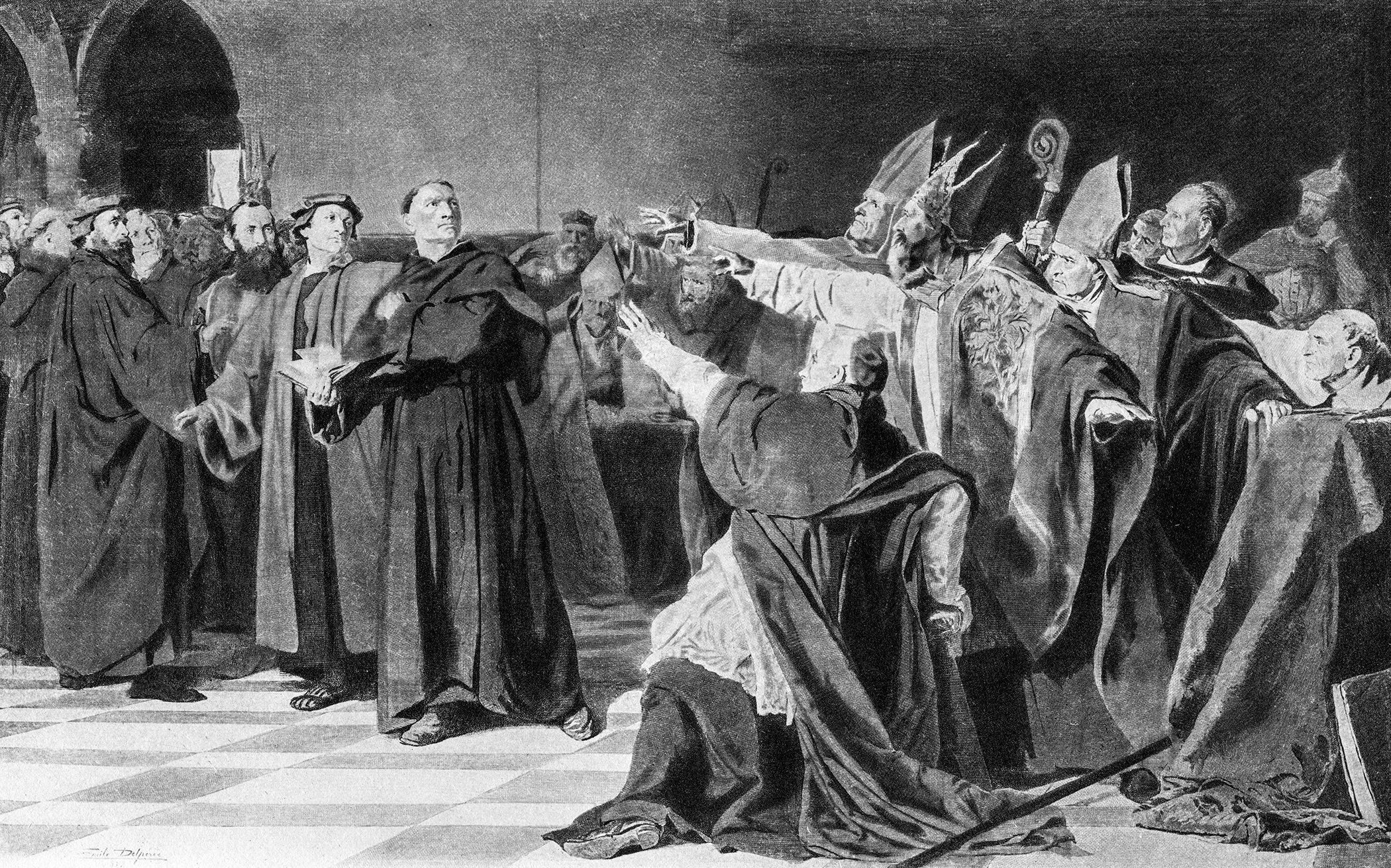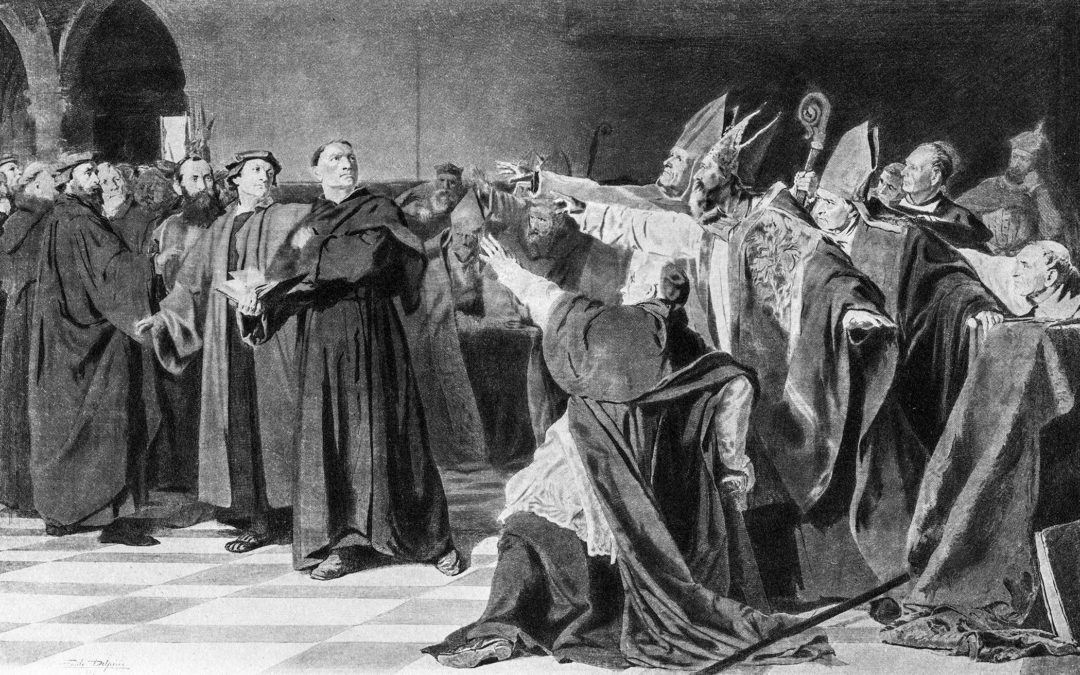
“Unless I am convinced by the teachings of Holy Scripture or by sound reasoning… I am tied by the Scriptures I have quoted and my conscience. I cannot and will not recant anything, for to go against my conscience is neither safe nor right. Here I stand. God help me! Amen.”
As Luther uttered these tortuously thought-out words, he had to have been wondering whether they might be his last. Already branded a heretic, Luther made his way to the Diet (assembly) at Worms in the spring of 1521 to stand before Charles V, the new Holy Roman Emperor.
At his coronation, Charles V pledged to “preserve the ancient Christian faith” and to “protect the Roman Catholic Church.” Luther—already excommunicated by that Church—pled for God’s help as he stood on the Word of God, against the Church, before the Church’s anointed protector (and, quite possibly, the most powerful man in the world).
The scene couldn’t be more dramatic, and the story couldn’t fit better with contemporary ideology.
We’ve always had a “rebellious” streak, but today’s culture has trumped any previous revolutionary thinking. If there’s one thing that’s celebrated today, it’s the undoing of “the established.” If anything seems wrong today, it is whatever has been the majority position of the past. Luther stood against the established Church, and that rebellious stand on his “minority” position is just the kind of story our culture feeds on.
While it’s good to celebrate the courage of Luther, this example has some potentially unhealthy applications in today’s context. Fed by our anti-establishment culture, we might see Luther’s stand as an example of why it’s okay for us to go our own way. However, that thinking might be too quick to join Luther in his rebellion against the Church, rather than join him in his position in the Church, with the Church, for the Church, under the Word of God.
In the Church
When Luther found problems within the Church of his day he did something that would be odd to today’s culture: he stayed in the Church.
“But isn’t ‘the Church’ just the house of ‘religion’? Isn’t it just one of mankind’s traditions, an established vestige of a former time? Isn’t true spirituality found outside the Church, in yourself?”
Too many people today think in ways close to this. When a problem is “sniffed out” in their church, they’re quick to go their own way. Despite the treasure we have in our freedom to gather and worship together, many go their own way seeking “spiritual food” in things like nature, music, or private meditation.
Luther would have none of this.
In Luther’s famed 95 Theses, he set out problems he saw in the Church, so that they might be discussed in the Church. When Luther ran into problems with the Pope, he asked that there might be a great Church Council to discuss these issues in the Church. When he was accused as a heretic, he invited his accusers to open the Word and show him where he was wrong, again inviting discussion in the Church.
Christianity is never an isolated faith, but a faith lived in community, centered on the preaching and teaching of the Word of God. Luther didn’t want to come up with his own views on God or develop his own spirituality; he wanted to work in the Church to best understand what God has revealed in Scripture.
Luther stood against the Church—but still in the Church, under the Word of God.
With the Church
In our context, independence of thought is often vaulted into a treasured place. People are proud of their own private interpretation of Scripture, and don’t mind trumping traditional teaching with “what it means to me.” But for Luther, his rebellion was not a rebellion of novelty, but a reformation call to the Church to examine the Word together.
Luther’s deep studies engaged not only his contemporaries but also the Church Fathers before him. While he had no shortage of quotes that argued against various Church Fathers, Luther was consistently cognizant of what others in the Church have had to say. His writings are full of references to various Church Fathers, and he argued that both their writings and his own should serve to point people back to Scripture.
His stand against the Church was not one he made in isolation or novelty of thought, but it was made in conversation with the many in his local church, and all those who had gone before him.
Luther stood against the Church, but still with the Church, under the Word of God.
For the Church
This is the key for Luther. He didn’t just find a problem with the Church and try to do things his own way. Luther stood against the Church because it had lost its foundation on the Word of God and its focus on the gospel (what God has done for us in Jesus Christ). In the face of this loss, Luther could do nothing but point people to God’s Word and to faith in Jesus Christ.
Luther recognized that—since people might err—we all must come under God’s Word to be enlightened by what is outside of us (not what’s inside of us). This is why Luther said “the greatest and principal purpose of every church service is to preach and teach God’s Word.”1 We do not know God’s Word in ourselves or by ourselves, but it comes to us from outside ourselves. Nature’s beauty, powerful music, or inner thoughts will never be a substitute for coming under the regular preaching and teaching of God’s Word, for the Church’s own good.
Furthermore, Luther knew the Church desperately needs to know that our salvation must lie outside of us—in Jesus Christ’s completed work—or we will never be able to stand before God. Luther sought to extend that truth for the Church. His stand against the Church was constantly directed to the care of souls under the gospel, and not taken up with prideful, individualistic intentions.
Because the Church is a refuge for sinners, we know errors will continue to seep into the Church. In the face of strong errors, we may need to take a stand against the Church, much as Luther did. But, as Luther showed, our stand should be in the Church, with the Church, and for the Church, under the Word of God.
Dr. Daniel Berge, Ph.D., serves as pastor of Immanuel Lutheran Brethren Church in Eugene, Oregon.

